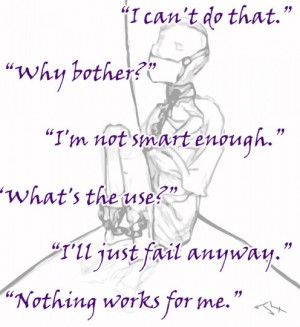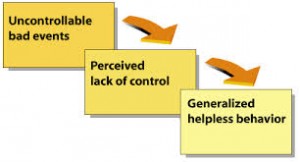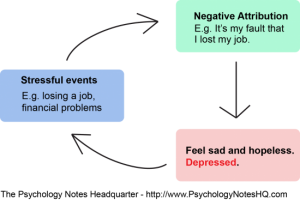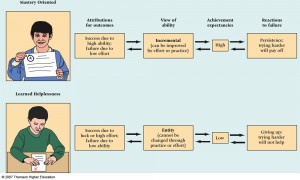 Learned helplessness is a technical term coined by Dr. Martin Seligman.
Learned helplessness is a technical term coined by Dr. Martin Seligman.
I don’t want to spend time with what he means by that, and how he came to discover this phenomenon… you can google it if you want to know.
If you are in the 67 steps, it’s step 7…
What I want to focus on here is the place where you won’t look: today… Where you locked yourself into a small box.
How come you are the way you are, how come you live in such a tiny box, no fulfillment, no energy, no love, no success…
So, how do you find the areas where you have learned helplessness limiting your life, the dance floor, the ability to accomplish?
Any area where you experience fear or resignation, or the two “attitudes” together.
 Resignation is saying that something IS hopeless. You can dislocate it by saying: it looks, to me, hopeless… or impossible, or hard, or beyond me.
Resignation is saying that something IS hopeless. You can dislocate it by saying: it looks, to me, hopeless… or impossible, or hard, or beyond me.
When you dislocate something to a place where you can be responsible for how you view something, if there is resignation and fear, then bingo: you found an area of learned helplessness.
Now, I am going ask you to exclude your fundamental belief about yourself and the doom.
 Why? Because that is not learned helplessness, that is your machine, inside which you could be anything, you could do anything, if it weren’t for learned helplessness.
Why? Because that is not learned helplessness, that is your machine, inside which you could be anything, you could do anything, if it weren’t for learned helplessness.
Tai suggests that you look in your past. I suggest that you look, right now, today, yesterday, this month.
- One form of learned helplessness is “I can’t… because…”
Another form of learned helplessness is “If I don’t do it, someone will come and do it for me…”Let’s see what we have here… Both are distinctions, so examples won’t be helpful until you get the distinction.In the first form, you say or think “I can’t” without looking, without experimenting, without doing your due diligence. The “I can’t” is a knee-jerk reaction.If I ask you what is the truth, I’ll find that you have no idea. The only thing I’ll see is that you’ve never actually looked there, gone there, risked there.Finding your areas of learned helplessness, the first “I can’t” kind is tricky: you need to be asked, suggested, to even go near it.Now, truth be told, you may have failed in that area before, and it was painful… I have areas like this in my life: won’t go into detail, but now that I am writing this article, I’ll revisit them and attempt to dislocate them by saying: It looks to me… impossible, etc. - The other form of learned helplessness is really a form of laziness. You have learned that there is a chance that someone will do it for you if you refuse to do it long enough.Wiping your ass comes to mind first. But, if you are the type who asks questions all the time, asking questions, certain types of questions, show your unwillingness, your refusal to look deeply, to do any thinking, to invest yourself.The the other form of learned helplessness is really a smoke screen: you are not helpless, you are pretending to be helpless.The student who asks me to explain, over and over, how to forgive her mother… in essence it is not that she can’t, it is that she won’t.
If you look, and for a moment you consider seeing the truth about you as a starting point for bigger and better things, you’ll find many areas of life that you refuse to deal with, things that you refuse to do.
 Now, whether I distinguished these two distinctions, we’ll find out.
Now, whether I distinguished these two distinctions, we’ll find out.
Your job is to find one or two, or many examples to both forms of “learned helplessness”, the actual learned helplessness, “I can’t” and the fake “learned helplessness”, the “I won’t”.
Please.
Consider that telling the truth about either, in the language of responsibility, will return the power to you.
And, between you and me, the experience of power is what is the closest to happiness you’ll experience in this life…
Innovating yourself out of the situation or the box:
I didn’t expressly say it, but considering that you see something one way, but it may be another way, is the starting point of innovating yourself out of your helplessness and the situation.
I have, many times, found myself in impossible situations, since I came to the United States.
The learned helplessness said: it’s not possible. It is even dangerous. The moment I said: I say that based on what I have seen that it’s impossible… but I haven’t seen it all…
The moment I said that, actions that before were “impossible” for me became what I started to do, and solved the seemingly impossible.
Now, what exactly innovating yourself out of the situation is not defined, but you can trust that telling the truth about the situation in a way that you own your view and attitude, is the starting point, no matter what innovating means…
PS: anothr article

An example of real learned helplessness: Me and math at school. Always had a hard time with it. My parents even got me a tutor for Algebra. After a while I would tune out of the lessons in the classroom, hoping to figure it out when I got home. I would try for a bit, then give up.
An example of the other form of learned helplessness is me not practicing a certain set of scales that i got from a teacher over a year ago. I just decided that they were too similar to distinguish, and too hard to remember, so I never looked at them. (Except for the one I already knew. And one other that looked easy. I actually wrote a nice little instrumental piece based on the easy scale, dedicating it to my teacher. I did pick them all up the other day to play through them, without thinking or opinionating, to see if I could in fact learn them by rote if I just practiced them.)